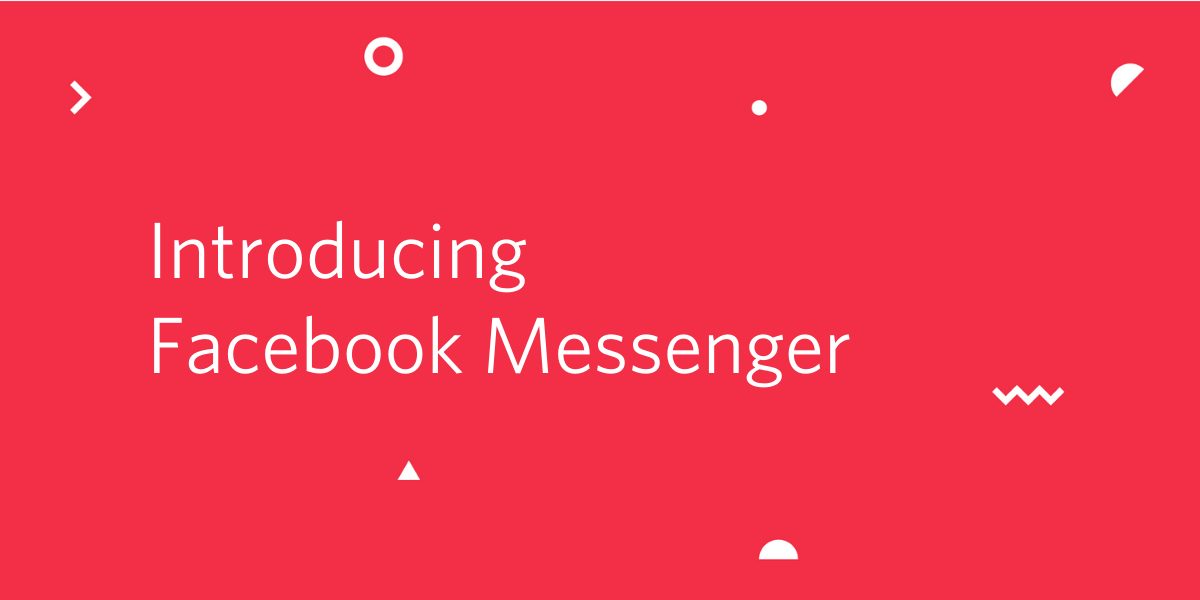Use Twilio to Communicate Through Facebook Messenger – Now Open for Early Access
Time to read:
This post is part of Twilio’s archive and may contain outdated information. We’re always building something new, so be sure to check out our latest posts for the most up-to-date insights.

Talking to businesses today can feel a bit clumsy. The effortless conversation we have with friends and colleagues is lost as we transition into the world of “press #1 to talk with sales” and “for help, email support@widgets.com”. What we really want is for all our communication to be prompt and conversational. And more often than not, we prefer a message over a call.
Developers understand this dynamic. At Twilio, we’ve seen customers build messaging experiences with SMS and IP Messaging that reach users the way they want to be reached. Today, we’re giving developers even more avenues to build conversations.
We’re extending the Twilio Messaging API to support Facebook Messenger – an app used by more than 1.1 billion people worldwide. You can access Facebook Messenger from inside the Console.
That means you can send and receive messages from the Facebook Messenger, using the Twilio API construct, docs, and developer tools you’re already familiar with.
How It Works
Getting started is easier than you might think.
After you sign up for early access and your Twilio account is enabled, you’ll be able to use Twilio’s existing Messaging API endpoint. If you already have an SMS app built with Twilio, there’s little to no code that needs to be changed.
There are just a handful of steps. For example, with Facebook:
- Create a Facebook for Business account if you don’t already have one.
- Then go to the Twilio Console to authorize Twilio to send and receive messages on your behalf through that Business account.
- Using Twilio’s Messaging API, replace the user’s phone number in the To= parameter with their Messenger ID or the phone number linked to their ID. Replace the From= parameter with a new unique identifier provided to you through the Console.
That’s it. You now have access to one of the most powerful messaging channels available in the world.
What It Means For You
The Facebook integration is based on 3 key principles:
- Using one platform across messaging apps lowers ongoing maintenance – API support across messaging apps is changing constantly, making it nearly impossible for developers to keep track. They’re a moving target that can send developers spinning their wheels to no avail. We’ve put a team in place to navigate the messaging app landscape and take care of ongoing integration demands. This way you don’t have to worry about updating your code when messaging apps change their APIs.
- Common development across channels eliminates the learning curve – With Twilio, apps like Facebook Messenger are programmable through the same familiar Twilio API and development tools you use for voice, SMS, IP Messaging, and video. You have a consistent experience to build, scale and operate your apps, no matter the channels of communication you choose.
- Minimal code changes speed up time to market – You should be able to add messaging apps as a new channel without rewriting a ton of code. If you’re using Twilio’s Messaging API today, there’s almost no additional work to start exchanging messages on Facebook Messenger. With Twilio’s integration, you can send messages right into these platforms using a user’s phone number, if they have it linked to their profile.
Finding the right mix of messaging apps vs other forms of messaging like in-app chat and SMS is still exploratory. We’re in the early days here. But one thing is clear: the growth of messaging apps is meteoric. It’s now a competitive imperative to at least consider how this channel will impact the customer experience.
We’re excited to see how the landscape changes and how businesses adapt to this new channel of customer communication. At Twilio, we want to help drive this innovation engine.
Pricing
Good news! During early access, there will be no additional charge to use this capability.
For Facebook, if you choose to reach someone over the phone number linked to their Messenger ID, you will incur a one-time $99 fee to Facebook. If you chose to send and receive all messages using Messenger IDs, then you won’t incur this cost. It’s free to use.
We can’t wait to see what you build now that the Twilio API you already know can chat through the messaging apps your customers use most.
For more information, sign up for Early Access. And don’t forget to register for SIGNAL conference where we’ll be covering these capabilities in the session “Newest Twilio Messaging Features” on day 2.
We plan to integrate even more messaging apps over time and enhance the API to automate the way you build conversations across various communication channels. So stay tuned!
Related Posts
Related Resources
Twilio Docs
From APIs to SDKs to sample apps
API reference documentation, SDKs, helper libraries, quickstarts, and tutorials for your language and platform.
Resource Center
The latest ebooks, industry reports, and webinars
Learn from customer engagement experts to improve your own communication.
Ahoy
Twilio's developer community hub
Best practices, code samples, and inspiration to build communications and digital engagement experiences.